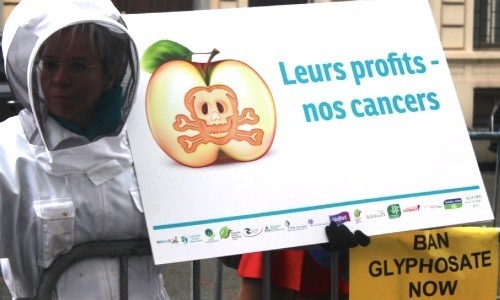
France, Sweden, Italy and the Netherlands Rebel Against Relicensing of Monsanto’s Glyphosate

Indeed, as EcoWatch reported last month, glyphosate is now the “most widely applied pesticide worldwide.” The paper, Trends in glyphosate herbicide use in the United States and globally, revealed that since 1974, when Roundup was first commercially sold, more than 1.6 billion kilograms (or 3.5 billion pounds) of glyphosate has been used in the U.S., making up 19 percent of the 8.6 billion kilograms (or 18.9 billion pounds) of glyphosate used around the world.
2.6 Billion Pounds of Monsanto’s Glyphosate Sprayed on U.S. Farmland in Past Two Decades http://t.co/VPEQFx6QTF @ewg pic.twitter.com/OmHwIFWmnJ
— EcoWatch (@EcoWatch) October 12, 2015
The substance is so widely used that it is commonly found in British bread, German beer and the urine of people in 18 countries across Europe, The Guardian said, adding that the chemical is banned or restricted in large parts of Europe because of alleged links to health problems such as birth defects, kidney failure, celiac disease, colitis and autism.
The contradictory conclusions from THE IARC and EFSA regarding the potential carcinogenicity of glyphosate spurred 96 prominent scientists from 25 countries to write a letter in strong opposition to the EFSA report.
In addition, nearly 1.5 million people petitioning the EU’s health commissioner, Vytenis Andriukaitis, for a ban on the substance, Sustainable Pulse reported.
According to The Guardian, “an EFSA panel based its recommendation that glyphosate was safe enough for a new lease of life on six industry-funded studies that have not been fully published.”
This video from the Corporate Europe Observatory, a non-profit corporate lobbying research group, alleges that Big Food corporations and biotech companies, including Monsanto, might have intimate ties with EFSA:
Environmental group Greenpeace has spoken out against the potential relicensing of glyphosate in Europe.
“EU governments seem more concerned about maintaining today’s destructive agricultural practices than protecting the health of people and the environment,” Greenpeace EU food policy director Franziska Achterberg said in a statement. “For a long time, glyphosate was thought to be safe. Now more and more scientific evidence tells us that it’s a serious threat to our health and the environment. Ignoring this evidence for another 15 years will cost us dearly. Europe needs an exit strategy from chemical pesticides and a move towards ecological farming.”
Global food advocacy nonprofit Slow Food is also demanding European governments reject the re-approval of glyphosate.
“There’s no room for compromise,” Carlo Petrini, Slow Food International president, said in a statement. “We have to decide whether the future of food is to be in the hands of the chemical industry with its promises to feed the planet—which, judging from the hundreds of thousands of tons of glyphosate sold every year, is a guise for evident economic interests—or of a policy that has the health of consumers and environmental welfare at heart.”
Monsanto is facing slumping profits and a slew of lawsuits alleging that exposure to glyphosate causes cancer. The St. Louis-based biotech giant maintains the safety of their flagship product and the chemical, and has demanded the World Health Organization retract their report.
Coffee Farmers Sue #Monsanto for Hiding Cancer-Causing Impact of #Glyphosate https://t.co/f5ai6JJ8ZW @nongmoreport pic.twitter.com/H4ExHXB0NY
— EcoWatch (@EcoWatch) February 9, 2016
YOU MIGHT ALSO LIKE
Why Is Glyphosate Sprayed on Crops Right Before Harvest?
DARK Act Heads to Senate, Bill Would Block Mandatory GMO Labeling

 233k
233k  41k
41k  Subscribe
Subscribe 